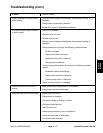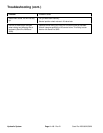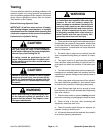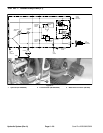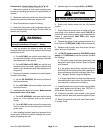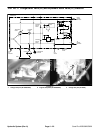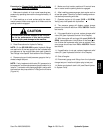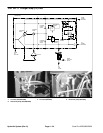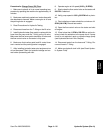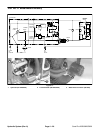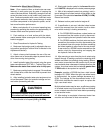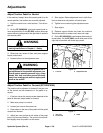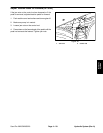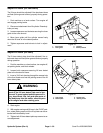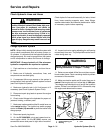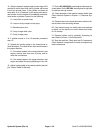
Procedure for Charge Pump (P2) Flow
:
1. Make sure hydraulic oil is at normal operating tem-
perature by operating the machine for approximately 10
minutes.
2. Make sure machine is parked on a level surface with
the attachments lowered. Make sure engine is off and
the parking brake is engaged.
3. Read Precautions for Hydraulic Testing.
4. Disconnect hose from the T–fitting on the lift valve.
5. Install hydraulic tester (flow meter) in series with the
hose from the pump and the T–fitting on the lift valve.
Make sure the flow arrow points toward the lift valve and
the flow control valve on the tester is fully open.
6. Make sure that traction pedal and lift control lever
are in neutral and the parking brake is engaged.
7. After installing hydraulic tester, start engine and run
at low idle speed. Check for hydraulic leakage and cor
-
rect before proceeding with test.
8. Operate engine at full speed (3150 +
50 RPM).
9. Slowly close the flow control valve on the tester until
500 PSI is obtained.
10. Verify pump speed is 3150 +
50 RPM with a photo
-
tac.
11. Flow indication on tester should be a minimum of 1
GPM (3.8 LPM). Record test results.
12. Open the flow control valve on the tester and shut
off engine.
13. If flow is less than 1 GPM or 500 PSI can not be ob-
tained, check for restrictions in the pump circuit. If pump
circuit is not restricted, repair or replace charge pump
(see Hydrostat Service in this Chapter).
14. Disconnect tester from the hose and T–fitting. Re-
connect hose to T–fitting.
15. Make sure hydraulic tank is full (see Check Hydrau-
lic System Fluid).
Sand Pro 2020/3020/5020 Page 4 – 25 Hydraulic System (Rev. A)
Hydraulic
Systems



